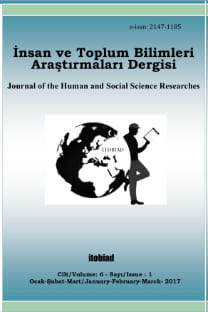Uluslararası Çerçevelere Göre 21.Yüzyıl Becerileri ve Eğitim Sisteminde Kazandırılması
21.Yüzyıl Becerileri, Öğrenen Becerileri, Okuryazarlık Becerileri, Beceri Gelişimi, Temel Beceriler
21st Century Skills According to International Frameworks and Building them within the Education System
21st Century Skills Learner Skills, Literacy Skills, Skill Development, Basic Skills, Basic Skills,
___
- References
- American Association of Colleges and Universities. (2007). College learning for the new global century. Washington: AACU.Ananiadou, K., & Claro, M. (2009). 21st century skills and competences for new millennium learners in OECD countries. OECD Education Working Papers, No. 41, OECD Publishing Retrieved from http://dx.doi.org/10.1787/218525261154Atalay, N. (2015). Fen bilimleri dersinde öğrencilerin öğrenme ve yenilenme becerilerinin gelişiminde yavaş geçişli animasyon uygulaması (Yüksek lisans tezi), Anadolu Üniversitesi., Eskişehir. Beers, S. Z. (2011). 21st century skills Preparing students for their future Retrieved from https://www.mheonline.com/mhmymath/pdf/21st_century_skills.pdf Binkley, M., Erstad, O., Herman, J., Raizen, S., Ripley, M., & Rumble, M. (2010). Defining 21st century skills Retrieved from http://atc21s.org/index.php/resources/white-papers/#item1 Brown, S. (2018). Best Practices in 21st Century Learning Environments: A Study of Two P21 Exemplar Schools. (Doktora tezi), Brandman, California. EnGauge. (2003). enGauge21st Century Skills. . Retrieved from https://www.cwasd.k12.wi.us/highschl/newsfile1062_1.pdfGray, A. (2016). The 10 skills you need to thrive in the Fourth Industrial Revolution. Paper presented at the World Economic Forum. Obtenida el.Hacıoğlu, F. (1990). 21. Yüzyıl İçin Öğretmen Eğitimi. Eğitim ve Bilim, 14(77), 48-53. Harari, Y. N. (2018). 21.yüzyıl için 21 ders (S. Siral, Trans.). İstanbul: Kolektif Kitap.International Society for Technology in Education. (2016). About ISTE Retrieved from http://www.iste.org/docs/Standards-Resources/iste-standards_students-2016_one-sheet_final.pdf?sfvrsn=0.23432948779836327IowaCore. (2010). K-12 21st Century Skills. Retrieved from https://www.educateiowa.gov/sites/files/ed/documents/K-12_21stCentSkills_0.pdfKenan, S. (2005). 21. yy'da Türkiye'de öğretmen olmak (EBSAD - Öğretmenlik Vizyon Programı Seminer Notları). Paper presented at the EBSAD - Öğretmenlik Vizyon Programı http://www.ebsad.org/img/20140407__2541009784.pdfLamb, S., Maire, Q., & Doecke, E. (2017). Key Skills for the 21st Century: an evidence-based review. Retrieved from https://education.nsw.gov.au/our-priorities/innovate-for-the-future/education-for-a-changing-world/research-findings/future-frontiers-analytical-report-key-skills-for-the-21st-century/Key-Skills-for-the-21st-Century-Executive-Summary.pdfMEB. (2015). Uluslararasi öğrencİ değerlendİrme programi PISA 2015 ulusal raporu. Retrieved from http://pisa.meb.gov.tr/wp-content/uploads/2014/11/PISA2015_UlusalRapor.pdfNational Research Council. (2011). Assessing 21st century skills: Summary of a workshop: National Academies Press.Nieveen, N., & Plomp, T. (2018). Curricular and Implementation Challenges in Introducing Twenty-First Century Skills in Education. In Assessment and Teaching of 21st Century Skills (pp. 259-276): Springer.OECD. (2018). The future of education and skills: Education 2030. Retrieved from https://www.oecd.org/education/2030/E2030%20Position%20Paper%20 P21. (2018a). Assessment: A 21st Century Skills Implementation Guide. Retrieved from http://www.p21.org/storage/documents/p21-stateimp_assessment.pdfp21. (2018b). Showcasing the Nation’s Best in 21st Century Learning. Retrieved from http://www.p21.org/storage/documents/exemplars/P21_Patterns_of_Innovation_Final.pdfPalomar College General Education. (2010). Palomar College General Education/Institutional Student Learning Outcomes. Retrieved from http://www2.palomar.edu/pages/sloresources/files/2014/05/PalomarGEoutcomedescriptions_050510Pers-Social-Resp.pdf; http://www2.palomar.edu/pages/sloresources/files/2014/05/PalomarGEoutcomedescriptions_050510-Int_Pract.pdf; ttp://www2.palomar.edu/pages/sloresources/files/2014/05/PalomarGEoutcomedescriptions_050510-KHCPNW.pdfPartnership for 21st Century Skills. (2009). Framework for 21st century learning. Retrieved from http://www.p21.org/our-work/p21-framework Partnership for 21st Century Skills. (2015). P21 framework definitions. Retrieved from http://www.p21.org/storage/documents/docs/P21_Partnership for 21st Century Skills (P21). (2003). Learning for the 21st century: A report and mile guide for 21st century skills. Retrieved from Washington, D.C.: https://files.eric.ed.gov/fulltext/ED480035.pdfSaavedra, A. R., & Opfer, D. (2012). Learning 21st-century skills requires 21st-century teaching. Phi Delta Kappan, 94(2), 8-13. Schleicher, A. (2018). Strong performers and successful reformers Lessons from PISA for Turkey OECD EMPLOYER BRAND. Retrieved from https://www.slideshare.net/OECDEDU/strong-performers-and-successful-reformers-lessons-from-pisa-for-turkeyTalim Terbiye Kurulu Başkanlığı. (2017). Müfredatta yenileme ve değişiklik çalışmalarımız üzerine. Retrieved from http://ttkb.meb.gov.tr/meb_iys_dosyalar/2017_07/18160003_basin_aciklamasi-program.pdfVoogt, J., & Roblin, N. P. (2012). A comparative analysis of international frameworks for 21st century competencİes: Implications for national curriculum policies. Journal of curriculum studies, 44(3), 299-321. Wagner, T. (2008). The global achievement gap: Why even our best schools don't teach the new survival skills our children need and what we can do about it: Basic Books.
- ISSN: 2147-1185
- Yayın Aralığı: Yılda 4 Sayı
- Başlangıç: 2012
- Yayıncı: Mustafa SÜLEYMAN ÖZCAN
İnsan Kaynakları Yönetimi Çalışanlarının İnsanlık Onuruna Bakışı
Psikolojik Danışman Adaylarının Koşulsuz Kendini Kabul Düzeyleri
YILMAZ BİNGÖL, MERYEM VURAL BATIK
İçsel Markalaşma Faaliyetleri İle İç Müşterinin Markayı Benimsemesi
HİLAL UYGURTÜRK, Selva Seza CANDAN
Referans İdeal Metodu ile Finansal Performans Analizi: BİST Sigorta Şirketleri Üzerinde Bir Uygulama
NEZİH TAYYAR, KORAY YAPA, Mert DURMUŞ, İBRAHİM AKBULUT
Sinema Sanatı Karşısında İki Aydın: Necip Fazıl Kısakürek ve Nazım Hikmet
Dünya Enerji Rekabetinde Oyun Değiştirici Olarak Kaya Gazının Rolü ve Türkiye’ye Olası Etkileri
Bülent Ulusu Hükümeti Döneminde Türk Dış Politikası (1980-1983)
Engelli Bireylerin Çalışma Psikolojisi: Algısal ve Tutumsal Farklılıkların Belirlenmesi
Öznel Sosyal Statü Ölçeğinin Türkçeye Uyarlanması
HİKMET TURKAY, HASAN ERDEM MUMCU, Osman KUSAN, ALİ DURSUN AYDIN, ESENGÜL GÜNGÖZ
